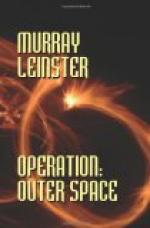But Cochrane grimaced.
“Maybe,” he admitted it. “But I’ve tasted the stuff. I think it’s foul! Still, if people want it ...”
He went back down to the communicator to contact the chlorella companies of Earth, to find out if there was any special data they would need to pass on the proposal.
* * * * *
And so presently the ship took off for home. It landed on the moon first, and Johnny Simms was loaded into a space-suit and transferred to Lunar City, where he could live without being extradited back to Earth. He wouldn’t stay there. Alicia guaranteed that. They’d move to the glacier planet as soon as hotels were built. Maybe some day they’d travel to the planet of the shaggy beasts. Johnny would never be troublesome again. He was pathetically anxious, now, to have people like him, and stay with him, and not under any circumstances be angry with him or shut him away from them. Alicia would now have a full-time occupation keeping people from taking advantage of him.
But the ship went back to Earth. And on Earth Jamison became the leading television personality of all time, describing and extrapolating the delicious dangers and the splendid industrial opportunities of star-travel. Bell was his companion and co-star. Presently Jamison conceded privately to Cochrane that he and Bell would need shortly to take off on another journey of exploration with some other expedition. Neither of them thought to retire, though they were well-off enough. They were stock-holders in the Spaceways company, which guaranteed them a living.
Cochrane put Spaceways, Inc., into full operation. He fought savagely against personal publicity, but he worked himself half to death. He spent hours every day in frenzied haggling, and in the cynical examination of deftly booby-trapped business proposals. His lawyers insisted that he needed an office—he did—and presently he had four secretaries and there developed an entire hierarchy of persons under him. One day his chief secretary told him commiseratingly that somebody had waited two hours past appointment-time to see him.
It was Hopkins, who had not been willing to interrupt his dinner to listen to a protest from Cochrane. Hopkins was still exactly as important as ever. It was only that Cochrane was more so.
It woke Cochrane up. He stormed, to Babs, and ruthlessly cancelled appointments and abandoned or transferred enterprises, and made preparations for a more satisfactory way of life.
They went, in time, to the Spaceways terminal, to take ship for the stars. The terminal was improvised, but it was busy. Already eighteen ships a day went away from there in Dabney fields. Eighteen others arrived. Jones was already off somewhere in a ship built according to his own notions. Officially he was doing research for Spaceways, Inc., but actually nobody told him what to do. He puttered happily with improbable contrivances and sometimes got even more improbable results. Holden was already off of Earth. He was on the planet of the shaggy beasts, acting as consultant on the cases of persons who arrived there and became emotionally disturbed because they could do as they pleased, instead of being forced by economic necessity to do otherwise.




